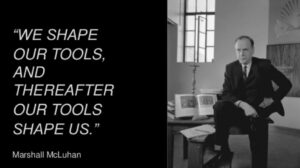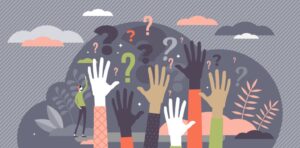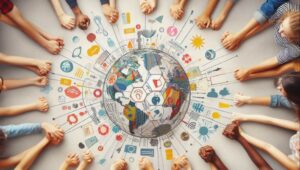Digitalization and Our New Culture of Participation
Our Digital Reality: A Shift in Education and Culture

The digital world has fundamentally altered how we communicate, interact, and learn. As highlighted in
the lecture, technological advancements have not only changed the tools we use but have also reshaped
our relationships with knowledge, media, and each other. McLuhan’s idea that “we shape our tools and then our tools shape us” perfectly captures this shift—education is no longer confined to traditional classrooms but extends into digital spaces where students are not just consumers but also creators of content.
Michael Wesch’s An Anthropological Introduction to YouTube reinforces this idea by illustrating how platforms like YouTube have enabled a participatory culture where individuals engage in global conversations, remix content, and redefine cultural norms. This participatory model is radically different from the top-down, teacher-centered approach that once defined education. Instead of passively absorbing knowledge, students today actively engage with information, collaborate online, and contribute to the knowledge economy in ways that were unimaginable in previous generations.
Implications for My Future Classroom
In a networked world where students are constantly connected, teaching can no longer be about simply delivering information. Instead, my role as an educator must shift toward guiding students in navigating, evaluating, and contributing to this vast information ecosystem. Key changes I will incorporate include:
-
Encouraging Active Participation

- Instead of relying solely on lectures, I will incorporate interactive digital projects where students create videos, blogs, and podcasts to demonstrate their understanding of concepts. This aligns with Wesch’s argument that digital media fosters engagement and self-expression.
-
Digital Literacy and Critical Thinking
- With the disappearance of traditional gatekeepers of knowledge (e.g., editors, publishers), students must develop the ability to critically analyze digital content. Teaching media literacy—fact-checking, recognizing bias, and understanding digital footprints—will be a priority in my classroom.
-
Global and Collaborative Learning

- The lecture discusses how our relationships with technology are changing, shifting from local to global interactions. My classroom will embrace this by integrating collaborative tools (e.g., Google Docs, discussion forums, and video conferencing) to connect students with peers worldwide, encouraging cross-cultural learning experiences.
What This Means for Schools
The traditional education model was built for an era where information was scarce and controlled by experts. Today, students have unprecedented access to information, making the traditional teacher-as-expert model outdated. Schools must adapt by:
-
Redefining the Role of the Teacher: Teachers should facilitate learning rather than dictate it, encouraging inquiry-based and student-driven exploration. As Wesch (2008) highlights, platforms like YouTube have fundamentally changed how knowledge is created and shared, allowing students to engage in self-directed learning beyond the classroom. Similarly, the lecture discusses how technology shifts our relationships with information, reinforcing the need for educators to become guides rather than sole providers of knowledge (Lecture, 2025).
-
Integrating Technology Thoughtfully: Instead of banning devices, schools should harness their potential for learning, offering structured opportunities for creativity and engagement. The lecture emphasizes how every new technology—whether the blackboard, radio, or television—was initially met with resistance, yet each ultimately transformed learning (Lecture, 2025). Likewise, Wesch demonstrates how digital platforms foster a participatory culture, making education more interactive and engaging when used effectively.
-
Assessing Beyond Memorization: Standardized tests measure recall, but in a digital world where information is readily available, we should prioritize assessing skills like critical thinking, collaboration, and digital ethics. The lecture points out that students today are not just consumers but also producers of content, meaning schools must emphasize skills such as media literacy and ethical participation in online spaces (Lecture, 2025). Wesch (2008) similarly argues that education should focus on fostering digital fluency, where students learn how to navigate, evaluate, and contribute meaningfully to the digital world.
By embracing these shifts, schools can better prepare students for a world where learning is no longer confined to textbooks but is instead a dynamic, evolving, and participatory process.
Balancing the Challenges and Possibilities of Our Digital Reality
While the digital world offers incredible opportunities, it also presents challenges. The lecture highlights the rapid increase in screen time among children, and Wesch’s video touches on issues like digital identity and online communities. Schools must strike a balance by:
- Setting Digital Boundaries: Teaching students how to engage meaningfully online while managing screen time and digital well-being.
- Addressing Privacy and Online Safety: Helping students understand the risks of oversharing and the permanence of digital footprints.
- Fostering Meaningful In-Person Connections: While digital communities are powerful, fostering face-to-face interactions remains essential for social development.
Conclusion
Education must evolve alongside the digital revolution, shifting from passive learning to an active, participatory, and globally connected experience. My future classroom will embrace these changes by promoting digital literacy, collaboration, and critical thinking, preparing students to navigate an ever-changing digital world. Wesch’s video and the lecture make it clear: we are no longer just learning from the internet; we are learning with and through it.
Now, Do you think the challenge ahead is whether schools should embrace this shift, or how we can do so in a way that enhances learning while maintaining human connections?
Hey Mort! I 100% agree that students need to understand the risks surrounding technology while engaging meaningfully. Too often we see young students fall victim to social bullying and scams that change their lives significantly for the worst. As educators, we need to teach them healthy habits involved with using technology, and how to do tasks without it.